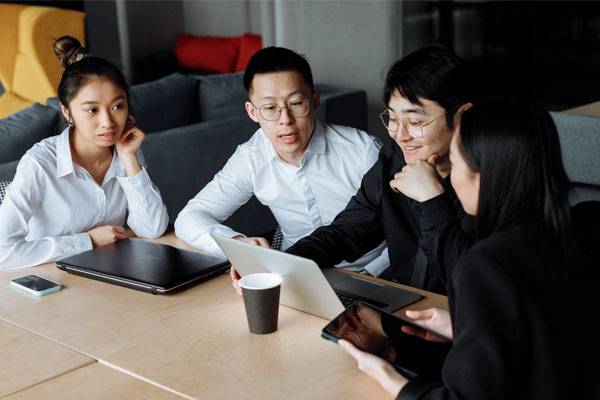AAPI LGBTQ+ Adults And Youth Face Heightened Mental Health Risks, Confirm Two New Studies
News
New studies have found greater rates of depression, suicidal thoughts, economic hardship, and discrimination within both the adult and youth Asian American and Pacific Islander (AAPI) LGBTQ+ communities in the United States.

Around 82% of AAPI LGBTQ+ individuals reported experiencing discrimination or harassment because of their sexual orientation; the same proportion reported experiencing discrimination or harassment because of their ethnicity, according to a recent study from The Williams Institute at the UCLA School of Law.
Another report released by The Trevor Project last month, found that 40% of AAPI LGBTQ+ youth between the ages of 13 and 24 seriously considered suicide over the past year, with 16% attempting suicide in the past year. Additionally, 54% of AAPI LGBTQ+ youth said they had faced discrimination based on their race or ethnicity over the past year, and 10% experienced discrimination due to their immigration status.
A combined 3% of LGBTQ+ individuals in the US are AAPI, and they face difference challenges compared to other LGBTQ+ populations, from immigration status to language barriers, Additionally, many AAPI migrant parents struggle with accepting that their child is LGBTQ+. The research is timely given that Asian American Heritage month is being celebrated in the US throughout May, and coincides with Mental Health Awareness Month.
The report on AAPI adults who identify as LGBTQ+ in the US carried out by The Williams Institute at the UCLA School of Law, analyzed a variety of issues including mental health and economic status, and how they compared to those of cisgender, heterosexual AAPI adults. When it came to mental health, the study found that about 21% of AAPI LGBTQ+ adults had received a diagnosis of depression, compared to only 7% of cisgender, heterosexual AAPI adults. Additionally, AAPI LGBTQ+ adults were more likely to participate in high-risk health behaviors, such as smoking and heavy drinking, than their cisgender, heterosexual counterparts. They were also more likely to experience economic insecurity, noted the report.
The Williams Institute study found that about 21% of AAPI LGBTQ+ adults had an annual household income below $24,000. Additionally, AAPI LGBTQ+ adults were more likely to face unemployment and experience food insecurity. According to Dr. Bianca D.M. Wilson, senior scholar of public policy at the Williams Institute and lead author of this report, the economic insecurity in AAPI LGBTQ+ people is similar to the disparities experienced by the entire LGBTQ+ community. However, AAPI LGBTQ+ individuals’ financial status is also impacted directly by several factors, including discrimination, minority stress, and rejection, as well as some indirect factors of mental health.
The research also found significant differences between the impact on Asian American versus Pacific Islander groups. For example, a greater percentage of Native Hawaiian Pacific Islander adults, whether they’re LGBTQ+ or not, were living with a lower income than all Asian American people. Additionally, Pacific Islander LGBTQ+ adults had children at almost the same rate as their cisgender, heterosexual counterparts. But that is not the case with Asian American LGBTQ+ adults.
“The differences between the experiences of Asian Americans and Native Hawaiian Pacific Islanders in the U.S. is likely a function of many factors,” Dr. Wilson shared with Medical News Today. “We know that historically Native Hawaiians and Pacific Islanders, their economic and health outcomes are discussed as a result of colonization and historical trauma in American Colonization and imperialism with Pacific islands, including Hawaii.”
AAPI people “have had to endure a heart-breaking legacy of discrimination in the United States, based on their racial and ethnic backgrounds,” according to Dr. Myeshia Price, senior researcher at The Trevor Project. "The AAPI community continues to face isolation, discrimination, and bullying because of their identity – and these negative experiences have only been compounded by the harmful stereotypes and offensive discourse around the coronavirus pandemic over the last few years. The marginalization of these young people based on both their identity as AAPI people and as LGBTQ+ people can contribute greatly to the discrimination they experience.”
Like the Williams Institute study, the Trevor Project report also found differences between Asian American and Pacific Islander LGBTQ+ young adults. The research found that Pacific Islander LGBTQ+ youth were more likely to be “out” to others about their sexual orientation than Asian American LGBTQ+ young adults. That said, Pacific Islander LGBTQ+ youth, in particular, reported higher levels of discrimination and physical harm because of their gender identity, as well as poorer mental health indicators, including the highest rate of anxiety and self-harm.
Dr. Price highlighted the urgent need for mental health resources to be developed for the unique needs of the AAPI LGBTQ+ youth and adult populations. “Our findings point to the protective nature of family, community, and racial/ethnic importance for AAPI LGBTQ+ youth. This highlights a need for caregivers to support and affirm the youth in their lives in both their AAPI and LGBTQ+ identities,” Dr. Price concluded. “That also means caregivers must invest time and effort into learning about these intersecting identities and – most importantly – ask the youth in their lives how to best support them. Further, given the importance of parents and family within this community, providing resources and support for parents, families, and community leaders of AAPI LGBTQ+ youth is an integral part of the intervention.”

